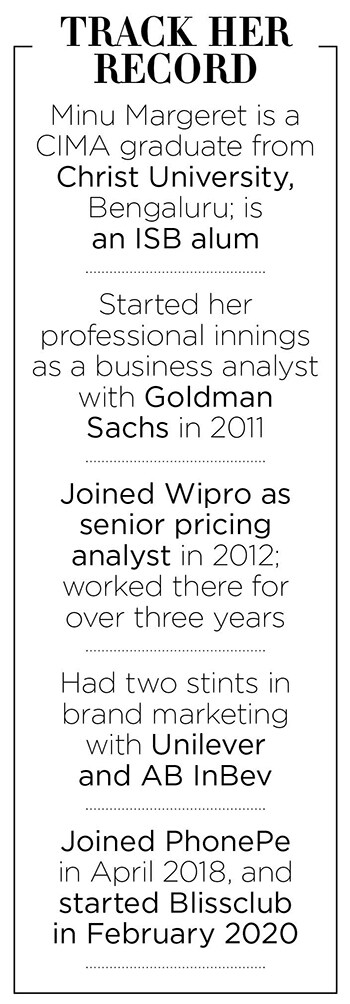
Blissclub: Born out of founder Minu Margeret's passion
Ultimate Frisbee player Minu Margeret discovered the play of 'lift and drag' during her motley corporate stint and wobbly part-time gigs. Finally, she found the perfect trajectory with Blissclub
 Minu Margeret, founder and CEO, Blissclub. Image: ELVAPRAKASH LAKSHMANAN for Forbes India
Minu Margeret, founder and CEO, Blissclub. Image: ELVAPRAKASH LAKSHMANAN for Forbes India
There are two simple rules to throw a frisbee. First, it needs enough lift, and not too much drag. Second, a frisbee doesn’t travel far if it is thrown without spin. Between 2012 and 2014, Minu Margeret—who started her corporate stint as business analyst at Goldman Sachs in 2011—tried to get a perfect arcing curve. Towards the end of 2012, she joined Wipro as senior pricing analyst. Like any youngster brimming with passion and the zeal to start something of her own, Margeret too explored a few side gigs. All that the young woman needed to fly with her dreams was surplus lift.
A startup in renting clothes was the first uplifting idea. The inspiration came from an American firm ‘Rent The Runway’. Margeret named her venture ‘Rent Your Wardrobe’. The idea and logic made sense. For all those who were new into a job or were still in college, buying party clothes was an expensive affair. So why not take it on rent? The venture, though, was aborted in the pilot stage. Reason: Operationally it was too difficult to make it work.
The indomitable Margeret moved on to her next gig. It was an automated laundromat for colleges which had mushroomed on the outskirts of Bengaluru. Again, the business and the idea made ample sense. There was demand and the rookie founder was taking care of the supply. She ran the business for a few years. The venture, though, couldn’t fly. She explains the reason: “Everything that could go wrong with a business went wrong.”
 First, it was operationally heavy. What this meant was one simple thing: Margeret had to be deeply sucked into the venture. But she wasn’t. Second, she had a co-founder, who had quit his job and was now involved full-time. But it didn’t work. Third, she had put in all her savings into the bootstrapped venture, which still needed more money. “We had to shut it down,” she recalls, adding that there were a lot of lessons to be picked up from two ‘failed’ ventures.
First, it was operationally heavy. What this meant was one simple thing: Margeret had to be deeply sucked into the venture. But she wasn’t. Second, she had a co-founder, who had quit his job and was now involved full-time. But it didn’t work. Third, she had put in all her savings into the bootstrapped venture, which still needed more money. “We had to shut it down,” she recalls, adding that there were a lot of lessons to be picked up from two ‘failed’ ventures.
The biggest learning was most interesting. Both the ventures had too much of drag, and too little lift—something which can’t let a frisbee fly! The setbacks also underlined another message. “Next time, I had to be smarter and sharper,” says Margeret, who quit Wipro in December 2015 and joined HUL the next year. But after four months, the accounts and finance pro moved on. “I wanted to learn the other side of the business and joined ISB,” she says. Margeret completed her MBA, joined AB InBev, and then PhonePe. Though she kept changing organisations, what didn’t change was a constant itch to start up. But this time, it had to be 100 percent involvement, and a venture which had enough spin aka impact. Finally, after eight years of a corporate stint, she quit towards the end of 2019.




 Margeret eventually started solo, and rolled out Blissclub in 2020. A year later, a seed round of $2.25 million came in May 2021. So was it a cakewalk to get the backers? “Absolutely not,” says the CEO and founder. When it’s a women-first business and women-first problems, then one needs somebody who can understand the pain points and a pressing need for an array of activewear products. The experience, though, was nothing less than amusing in multiple conversations with venture capitalist (VCs). “So, you make leggings. Right?” asked a few ignorant ones. “If so, how are they different from the ones which are worn with kurtas?” was the follow-up blooper. “Are you comparing Nike with unbranded stuff?” retorted a vexed founder. India, she underlined, doesn’t have great technical and comfortable sportswear products for women. “We are trying to change the narrative,” she stressed. The same conversation, she now reckons, would not have happened had there been women on the other side.
Margeret eventually started solo, and rolled out Blissclub in 2020. A year later, a seed round of $2.25 million came in May 2021. So was it a cakewalk to get the backers? “Absolutely not,” says the CEO and founder. When it’s a women-first business and women-first problems, then one needs somebody who can understand the pain points and a pressing need for an array of activewear products. The experience, though, was nothing less than amusing in multiple conversations with venture capitalist (VCs). “So, you make leggings. Right?” asked a few ignorant ones. “If so, how are they different from the ones which are worn with kurtas?” was the follow-up blooper. “Are you comparing Nike with unbranded stuff?” retorted a vexed founder. India, she underlined, doesn’t have great technical and comfortable sportswear products for women. “We are trying to change the narrative,” she stressed. The same conversation, she now reckons, would not have happened had there been women on the other side. 



